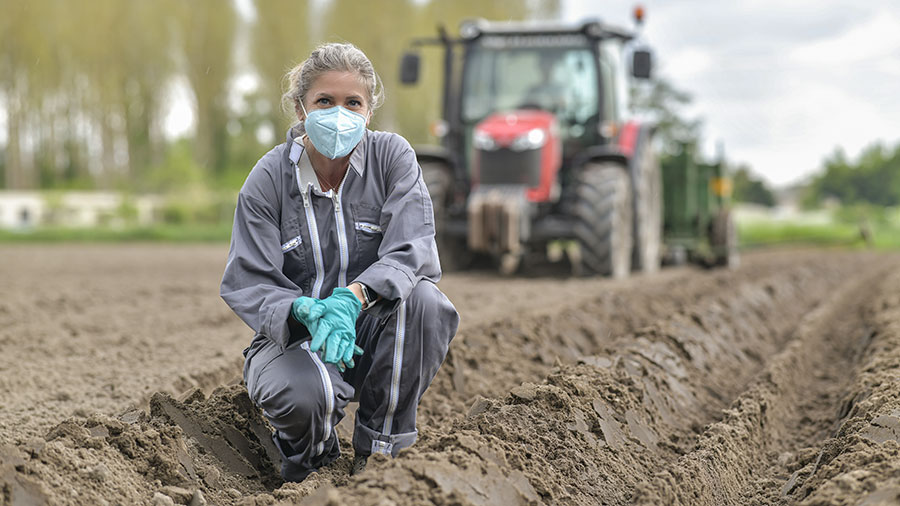Coronavirus: Advice for managing and keeping staff safe
 © AdobeStock/ElitProd
© AdobeStock/ElitProd Farmers may be wondering how to best protect their staff during the coronavirus outbreak.
We asked Oliver Dale, managing director at Safety Revolution, and Sophie Walker, business manager at the health and safety specialist, for some advice.
Farmers are being warned not to underestimate the threat of coronavirus on the farm.
While rules about social distancing may not seem relevant for farmers who are lone working, it is important for those who employ staff.
Farm employers must have systems in place to ensure employee health and wellbeing.
1. Identify any members of the workforce who are vulnerable
Farming has an ageing population with many over-70s still working on a farm.
While it might be difficult to stop these people working, as an employer you have a moral and a legal obligation to apply the rules the government has set. These can be found by visiting the government’s coronavirus website.
See also: Coronavirus: Advice for vets and farmers
The government has issued guidance that strongly advises people who are at higher risk if they catch the disease to take strict measures and to stay at home. This includes:
- Those with a long-term health condition, for example asthma, diabetes or heart disease, farmer’s lung or a weakened immune system as the result of medicines such as steroids or chemotherapy
- Pregnant women
- People aged 70 and above
- Those who care for someone with a health condition and who might put them at greater risk.
What should you do?
- Identify those with underlying health conditions
- It is not good enough to simply ask employees if they are fit or not
- Ask them to complete a medical questionnaire and then sit down with each individual and discuss it with them. You can download a free medical questionnaire from Safety Revolution
- This shouldn’t be seen as just a form-filling exercise
- If anyone has any underlying health issues which make them vulnerable as listed above then they should not be working.
2. Emphasise the importance of good hygiene
Make sure you have good sanitary facilities. You should provide soap and hot water.
If your employees are out on the road and are not able to access soap and water, they should be provided with suitable alternatives such as alcohol wipes or gel, or mobile hand washing facilities.
3. Maintain your distance
Follow the government’s advice by keeping at least 2m apart.
Do not share vehicles. If you can’t avoid doing so, they must be thoroughly disinfected between each use.
Stagger break times to reduce contact in social areas, or encourage staff to take their break in their vehicle.
There may be situations when physical distancing isn’t possible such as when milking in a parlour. In this instance, look at your practices and see if there is anything you can change to increase distances.
If physical distancing cannot be achieved increase the use of personal protective equipment (PPE). This includes face masks, disposable overalls, gloves, helmets for quad bikes, and face shields. Make sure these are disposed of in a safe way and are never shared.
4. Make sure staff adhere to rules
Some staff may think you are over-reacting, but it is important that you get buy-in from the start.
This can be done by working with staff and drawing up a safe working practice document together.
If they understand the reasons for doing this from the start they are more likely to adhere to the rules.
Remind your staff that we all have a social responsibility and to reinforce this show them a five-minute clip of an A&E worker on the front line.
5. Exclude sick or non-compliant staff
Anybody showing symptoms should be excluded from work immediately and must go into lockdown for seven days.
Likewise, any workers who do not follow the basic guidelines set out in the safe working document or who are not following government guidelines outside of work should be excluded immediately, as they pose a risk to the rest of your workforce.
6. Minimise contact with third parties
If you have non-essential building work taking place this should stop immediately.
When feed deliveries, vets or agronomists come on to the farm, good hygiene and social distancing rules should be followed.
7. Employing new people
In the coming weeks as the cases of coronavirus increase, staff will inevitably go off sick and extra resources will be required.
Gaps will also need to be filled where foreign nationals have left.
It is important to induct any new member of staff correctly and only bring people on site who stand the best chance of remaining healthy.
You have a legal obligation not to put someone in a situation that could damage their health.
8. Managing mental health
These are challenging times for everyone and while it is a physical disease we are fighting, the impact on people’s mental health will be great.
Communicate with each other, be responsible and engage with staff. Charities such as RABI offer great support to those in need (see below for a list of contacts).
Where to get help
- The Royal Agricultural Benevolent Institution (Rabi) offers financial support, practical care and guidance to farming people of all ages, including farmers, farmworkers and dependants. They can be contacted on 0808 281 9490
- The Farming Community Network (FCN) offers free, confidential, pastoral and practical support. Their helpline is open from 7am-11pm. Tel: 0300 011 1999
- RSABI is Rabi’s sister charity in Scotland. It provides emotional, practical and financial support to people in the agricultural sector. Tel: 0300 111 4166.
Case study
Dairy farmer and RABDF chairman Peter Alvis lists some of the ways he is managing his staff differently on his 700-cow dairy farm and cheese processing facility in Bristol.

Peter Alvis
Communicating to staff
We have been writing to the staff at least once a week to let them know of any rules changes as well as reinforcing the rules around social distancing and good hygiene.
Monitoring staff health
At our cheese processing plant, we have 100 people on-site at any one time.
Last week, we started taking their temperatures as they came into work and as they exited, and anyone with a slight temperature or showing any symptoms was sent home immediately.
Maintaining social distancing
We have asked people not to share transport to and from work. The message is, “if you don’t live together don’t travel together”.
We have also staggered staff break times to reduce the number of people in close proximity.
Providing staff with proof they are key workers
We have issued each staff member with letter-headed paper explaining who they work for and what their jobs are, just in case they are stopped by the police. This is to minimise any confrontation.
Changing working practices
We have reinforced the importance of social distancing in places such as the milking parlour.
In our processing plant, we have introduced extra PPE equipment and installed transparent screens between each work station.
Minimising outside contact
We have stopped all unnecessary visits on to the farm.
Unless it is absolutely critical then third parties should not be coming on to your farm.
It is also worth checking with your insurance company to see if you are covered if your milk isn’t collected.
If you don’t have insurance, it is worth asking if you can get any.
NFU Mutual has said it will cover customers who already have uncollected milk insurance.
